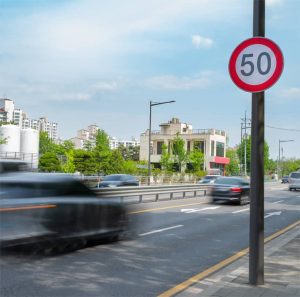The alarming number of fatal car accidents in the UK – 1,558 people lost their lives on our roads in 2021 – demands a close examination of the factors contributing to these tragic incidents. One element that significantly increases the severity and frequency of fatal accidents is speeding. Excessive acceleration not only poses a grave risk to the driver but also endangers passengers, pedestrians and fellow motorists.
The consequences of speeding are far-reaching and have devastating impacts on individuals, families and communities. But what psychological and societal factors influence drivers’ decisions to exceed velocity limits, and what’s the correlation between speeding and other risk-taking behaviours on the road?
Investigating the motivations behind speeding
Speeding can stem from a variety of reasons. Understanding these underlying motivations is essential to comprehending the complex dynamics contributing to driving too fast and its potential consequences.

Street racing, for instance, is associated with a desire for excitement and adrenaline. The lure of competition and the need for social recognition result in devastating accidents and deaths.
Similarly, some drivers feel compelled to showcase their driving prowess or seek validation through excessive velocity. Whether it is an attempt to impress peers or satisfy the personal ego, the urge to exhibit driving skills leads to reckless behaviour on the road. This need for validation often overrides rational thinking and prompts individuals to push the limits of their vehicles and own capabilities, increasing the likelihood of fatal accidents.
Time pressures and a sense of urgency can also contribute to speeding. Be it work, appointments or personal obligations, the desire to save time can result in drivers taking unnecessary risks and compromising their safety and that of others on the road.
Overestimating one’s reaction time and driving abilities is yet another reason drivers exceed the velocity limit. Individuals often exaggerate their capacity to react swiftly to unexpected events or emergencies on the road. But the reality is that higher speeds significantly reduce the margin for error, amplifying the potential for catastrophic outcomes in the event of an accident.
Furthermore, subjective judgments of suitable speeds can contribute to unintentional speeding. Drivers may perceive the velocity limit as overly conservative, leading them to exceed it based on their own assessment of road and traffic conditions. However, this subjective approach disregards the comprehensive analysis conducted by traffic engineers and regulators to establish appropriate limits that consider various factors, including road design, traffic volume and safety considerations.
How speeding impacts the likelihood of a fatal accident
When vehicles exceed the designated speed limits, several critical factors come into play that directly contribute to the heightened risk of fatal accidents.
- Reduced reaction time: Higher velocities diminish the time available for drivers to react to unexpected events or hazards on the road. A split-second delay in perceiving a danger or initiating an evasive manoeuvre can have devastating consequences as the margin for error decreases exponentially.
- Increased stopping distance: As the speed of a vehicle increases, so does the braking distance. This means that when a driver identifies a hazard and applies the brakes, the vehicle will continue to travel a considerable distance before coming to a halt.
- Impaired vehicle control: Increased velocity affects the vehicle’s stability and manoeuvrability, reducing the driver’s ability to negotiate curves, make lane changes, or navigate sudden obstacles effectively.
- Magnified crash power: The kinetic energy of a moving vehicle increases exponentially as its speed rises. Consequently, in the event of a crash, the force of impact is significantly amplified, leading to more substantial damage to the vehicles involved and a higher likelihood of severe injuries or fatalities for the occupants.
- Decreased effectiveness of safety features: Modern cars are equipped with various safety features designed to protect occupants in the event of an accident. However, these safety features, such as airbags and seat belts, are optimised for specific crash scenarios and speeds. Exceeding the recommended limits compromises the effectiveness of these mechanisms.
- Limited time for error correction: Speeding reduces the time available for drivers to correct errors or adjust their driving behaviour. Mistakes, such as misjudging a gap during a lane change or failing to notice a changing traffic signal, can have catastrophic consequences when coupled with high speeds.
The risk explained by numbers
- With every 1% increase in speed, the risk of an accident rises by 2%, the likelihood of sustaining severe injuries escalates by 3%, and the probability of a fatality surges by approximately 4%.
- Driving at 80 miles per hour on a road where traffic is moving at 70 significantly amplifies the risk of a crash by 31%, raises the probability of a collision with injuries by 49%, and drastically elevates the potential for a fatality by 71%.
- When struck by a car travelling at 35 miles per hour, an individual is five times more likely to lose their life compared to a person hit by a vehicle travelling at 20 miles per hour.
- A driver travelling at 40 mph covers twice the distance as a driver travelling at 25 mph before achieving a complete stop.
What to do if you’ve lost someone
Losing a loved one due to a fatal car accident caused by a driver exceeding the speed limit is a challenging and traumatic experience. The emotional and financial losses that result from such a tragedy can be overwhelming. Fortunately, there are avenues of support that help individuals navigate these difficult circumstances, including bereavement damages.
One crucial option is seeking compensation. It can provide much-needed financial assistance to cover various expenses and alleviate some of the burdens the grieving family faces. It can help address funeral costs, medical bills, loss of income and other financial hardships that arise from the loss.
Reaching out for professional legal support is also highly recommended. Fatal Accident Claims, a service operated by Hutcheon Law, offers dedicated assistance and guidance for those who have suffered a loss due to another person’s negligence. By contacting Fatal Accident Claims, individuals can speak with specialist and compassionate solicitors who understand the complexities of such cases and provide the necessary support and legal advice.
Our knowledgeable solicitors will lend a listening ear, offer empathetic support and explain the possibilities for pursuing a claim. We understand the situation’s sensitivity and will guide individuals through the legal process with care and professionalism.
Fill out the contact form or call us. Our compassionate team is here to assist you.


